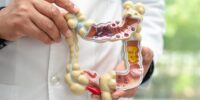A Prebiotic Diet Containing Galactooligosaccharides and Polydextrose Attenuates Hypergravity‑Induced Disruptions to the Microbiome in Female Mice
A 4‑week prebiotic diet study investigated the effects of adding galactooligosaccharides (GOS) and polydextrose (PDX) to the diet on gut bacteria and host health markers in female C57BL/6 mice. Forty mice were split into two main groups — one received the GOS + PDX diet, the other a standard diet. Half of each group then spent four weeks under 3× Earth’s gravity (hypergravity), while the rest stayed at normal gravity. Researchers collected stool samples weekly for 16S rRNA sequencing and, at the end of the study, measured blood markers of inflammation (neutrophil‑to‑lymphocyte ratio, NLR) and red blood cell changes (red blood cell distribution width, RDW‑CV).
The results showed that the prebiotic diet kept gut bacteria more stable over time, even under the stress of hypergravity. Mice on GOS + PDX did not experience the same spikes in potentially harmful bacteria, like Clostridium sensu stricto 1 and Turicibacter, seen in the control group. They also had a lower NLR (less systemic inflammation) and a higher RDW‑CV, suggesting better red blood cell adaptability. Changes in specific bacterial groups closely tracked with these blood markers, pointing to a clear gut–body link under stress.
These findings support the idea that prebiotic fibers like GOS and PDX help buffer against stress‑induced gut imbalances and the resulting inflammatory responses. By keeping key bacterial populations in check, they also seem to influence immune and blood‑cell measures.
The study’s main limitations are its focus on only female mice, one type of stress (hypergravity), and a relatively short intervention period. We still need to know how these prebiotics work over longer periods, in males, under different stressors (e.g., microgravity), and ultimately in humans.
Future research should explore longer trials, varying doses and combinations of prebiotics, inclusion of male subjects, and human or microgravity analog studies to confirm real‑world benefits.
Overall, this work highlights the promise of dietary prebiotics as a simple, safe way to protect gut health and curb stress‑related inflammation, with exciting implications for astronaut wellness, clinical stress support, and microbiome‑focused therapies.



